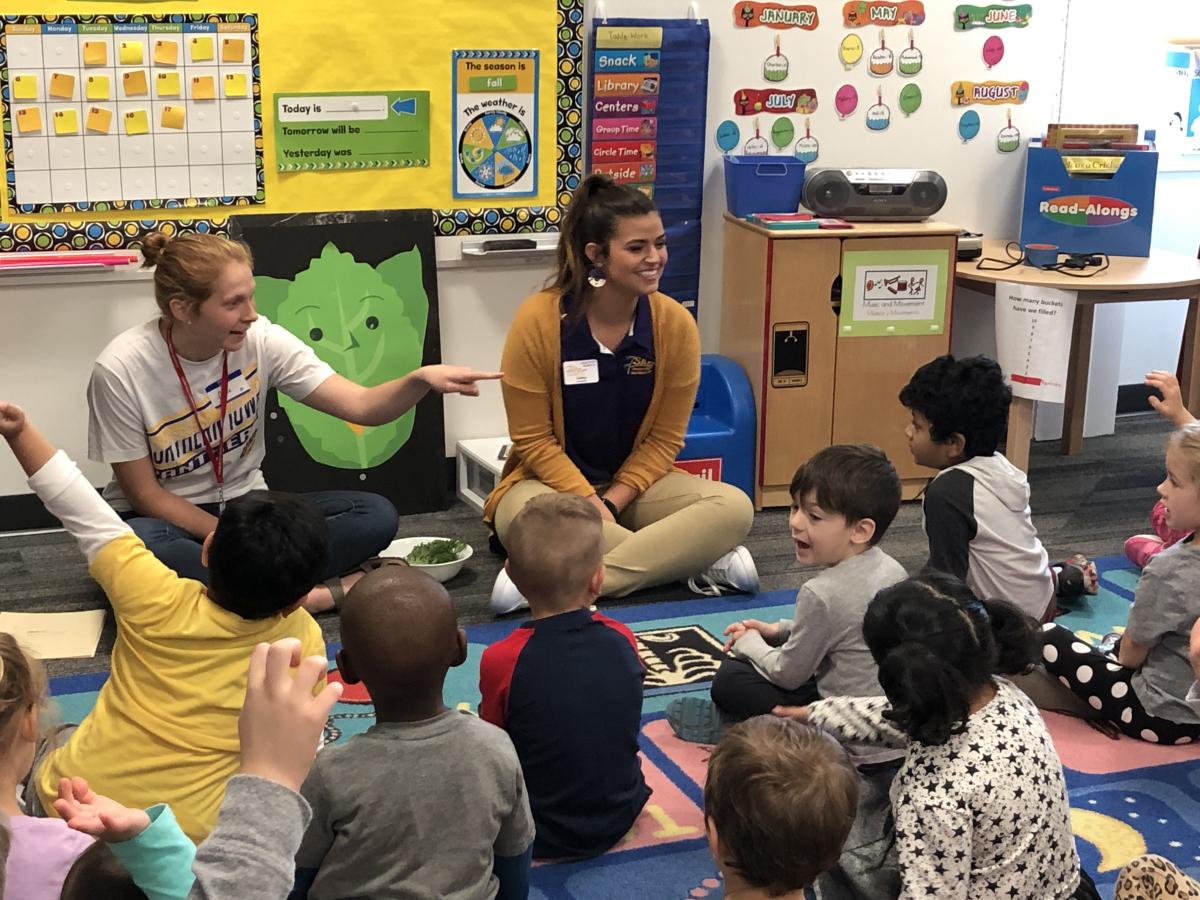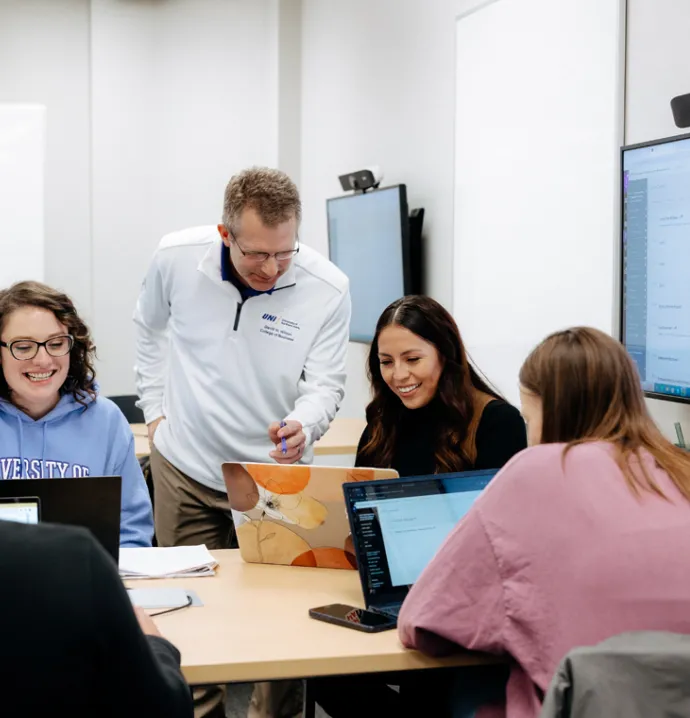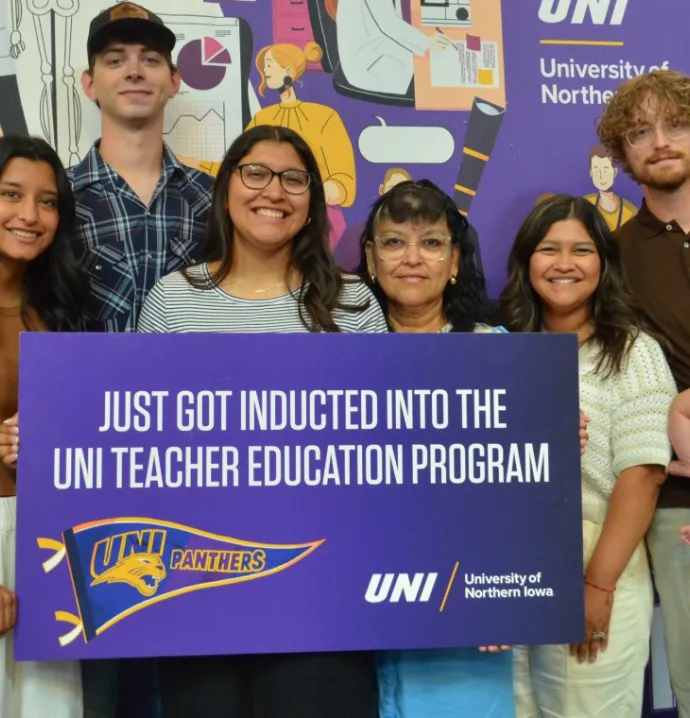Public health majors in partnership with CEEE win big with Farm to School program
Public health majors in partnership with CEEE win big with Farm to School program

For seven years University of Northern Iowa public health majors have collaborated with the Center for Energy & Environmental Education (CEEE) UNI Local Food Program to educate elementary school students on how food gets from a farm to their plate. The success of the program earned a recent Community Collaboration award from the Iowa and Minnesota Campus Compact which is a coalition of 60 college and university presidents throughout the two states.
For the Farm to School program, public health majors at UNI go into elementary schools and introduce the students to locally grown fresh produce. The elementary students get to learn about nutrition and try foods that may be brand-new to them. The public health majors from Susan Roberts-Dobie’s class lead the lessons, and UNI Local Food Program manager at the CEEE Jodie Huegerich coordinates with local farmers to get that produce.
“When you have a program that's been going on for this long, that's a little unusual, both in the community and at the university level,” said Roberts-Dobie. “It really is a nice model of UNI partnering with schools, and it was such a nice fit between the CEEE, our department and the local schools. It seemed like a natural thing to nominate the program for an award about engaging in the community.”
Roberts-Dobie estimates that 100 public health students have been involved with the program in the last seven years.
“The entire goal of one of the classes I teach — this implementing class — is to practice the delivery of health education materials in the community,” Roberts-Dobie said. “Farm to School was a perfect way for my students to have a very concise, short-term, highly structured delivery of information with kids, which is one population that public health works with.”
Roberts-Dobie believes the program is providing many learning opportunities for her students, including experience with public speaking and classroom management. Not only do the public health majors deliver the lessons, but they also write them.
Working with children also allows public health majors to diversify their experience since many have only ever worked with adults. This was one area of growth for Megan Sigmund, a public health major from Roberts-Dobie’s class who is going into her senior year in the fall, since before the program she primarily had experience working with college students and adults.
“The biggest lesson I learned was to focus on the population that you're speaking to,” Sigmund said. “I had to make sure the words I was using could be understood by students in kindergarten through third grade and keep their attention.”
Of course, the public health majors aren’t the only ones benefiting from this experience. The elementary students are learning how to make the healthy choice the easy choice in a convenience-driven world.
“The culture right now is very pro fast food and convenient food,” said Sigmund. “So teaching these kids at a young age that the local produce is even better than the grocery store is so important. I know fast food is around the corner, and it's easy. But you need that nutrition, too.”
While Sigmund said she was overwhelmed learning about the assignment in the beginning, it was rewarding to experience in the end.
“I really liked seeing all the kids just so happy about this,” she said. “It was really cool to see them have fun with healthy food.”
The children’s excitement over fresh produce didn’t end when they left the classroom. Huegerich said parents have provided feedback saying that their elementary-aged children are now requesting to go grocery shopping and eat foods like fresh bell peppers thanks to the program.
A key component of the Farm to School program is that all the food the elementary students are trying is locally grown. In the process, the students are learning that local farmers grow much more than the corn and beans they might be used to seeing. Some schools even have their own gardens, so the kids get to enjoy food they’ve helped grow themselves.
In her role as UNI Local Food Program manager, Huegerich works with a wide variety of farmers in a six-county local region, giving her many options for where to get kale, zucchini, spinach and other fresh foods in the area. Often, she selected farmers for the Farm to School Program based on which ones were coming to the Cedar Valley to participate in a farmers’ market.
“Once you add the local component, you get students realizing that there are really awesome things that are grown right here in their community,” Huegerich explained. “They can actually meet the people that are growing their food if they were to go to a farmers’ market or attend a local food event with producers.
Huegerich’s involvement with the local Farm to School program pre-dates her work at UNI. In the beginning, before the public health majors became involved, the program was led by parent volunteers, and Huegerich was one of the volunteers at Lincoln Elementary School. Lincoln Elementary started the Farm to School program to meet the certification requirements of becoming a Blue Zone School, which is a school that is working to create a healthy environment for students.
A couple of years after Huegerich started volunteering in the Farm to School program, Roberts-Dobie also got involved as a parent volunteer and connected with Huegerich.
“The parent volunteers were doing the education piece, and most of the parents didn’t feel comfortable with that,” Roberts-Dobie explained. “I knew I could fix it by getting my students involved.”
The switch from parent volunteers to public health majors may have also contributed to the program’s long-term success.
“Anytime something is all-volunteer, that's really hard to sustain,” said Huegerich. “So if we could connect to something in the community, like a UNI class, it would be more likely to continue and grow — which it has.”
Currently, the program is established in Lincoln and Aldrich Elementary schools. Huegerich said they have a long-term goal of bringing the program into all seven Cedar Falls elementary schools.




